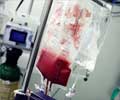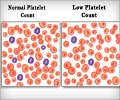Highlights:
- Blood transfusion during liver cancer surgery may lead to the recurrence of cancer and premature death
- More randomized trials are required to assess the influence of blood transfusion on cancer outcomes
- Surgeons should also focus on practices that would reduce the need for transfusion
Read More..
Hepatocellular Carcinoma (HCC) and its Treatment
HCC is the fifth most common form of cancer and the third most common cause of cancer-related deaths worldwide. People with cirrhosis, which is scarring of the liver caused by earlier damages from hepatitis B or C virus, or long-term alcohol abuse, have the risk of being affected with HCC. Liver resection, a surgical procedure that removes cancer and a margin of healthy tissue that surrounds it is used to treat patients with early-stage liver cancer, having a normal liver function. Despite advances made in liver surgery that have helped reduce the surgical blood loss considerably, liver resection is associated with the risk of excessive blood loss and requirement of blood transfusion.Blood Transfusion and Cancer Outcomes
The magnitude of the effect of blood transfusions on cancer outcomes has never been understood completely. Research on this subject has reported conflicting findings for decades now. It has not been possible to arrive upon a conclusion if the problems are caused by blood transfusion alone.There was a noticeable increase in risk even when a small amount of blood was transfused, the researchers of the study have reported. The study findings have shown that cancer recurrence risk increased by 23 percent and death by 55 percent following transfusion of 1 to 4 units of blood, when compared to matched controls.
Dr Ying-Hsuan Tai from Taipei Medical University Shuang Ho Hospital in Taiwan, the study’s lead researcher remarked, “Our findings from a large cohort highlighted a significant association between red blood cell transfusions and the risk of cancer recurrence as well as a dose-response relationship between the amount of transfusions and death after curative surgery for liver cancer. The reason why blood transfusions substantially worsen cancer prognosis remains unclear, but it is likely to be related to the suppressive effects on the immune system,”
Study Design and Results
The effect of perioperative blood transfusion on cancer prognosis in 1,469 patients who had undergone HCC resection surgery at Taipei Veterans General Hospital, Taipei, Taiwan between 2005 and 2016 was studied by Dr. Tai and his team. There was no lymph node involvement or metastasis in these patients. Postoperative disease-free survival and overall survival up to September 2018 were assessed by the team.While comparing patient outcomes, inverse probability of treatment weighting, a statistical modeling technique was used to match patients who had equivalent age and health conditions.
1 to 4 units of allogeneic blood were given to 1 in 3 patients (30 percent; 447 patients), during or within 7 days of surgery, while more than 4 units were given to more than 1 in 10 patients (12 percent; 179 patients). In a median 45 month follow-up, investigations showed that there was a 23 percent chance of cancer recurrence in patients who received a transfusion (1-4 units) as compared to those who did not. Similarly, patients who received more than 4 units were faced with an 18 percent greater risk of recurrence when compared to those who did not receive any.
Patients who received 1-4 units of blood were 55 percent more likely to die from any cause in comparison to those who did not receive a transfusion. Those who received 4 or more units had almost double the risk of death.
The authors of the study concluded, “These data highlight the need for randomized trials to evaluate the influence of transfusion on cancer outcome and identify the level anemia that patients undergoing liver cancer surgery can withstand (or the minimum amount of blood they need to have transfused) with minimal adverse effects in order to guide practice. Until these trials have been completed, surgeons should use practices that reduce the risk of bleeding and the need for transfusion.”
The findings of the study will be presented at the Euro-anaesthesia Congress, the annual meeting of the European Society of Anaesthesiology to be held this year at Vienna, Austria.
Reference:
- European Society of Anaesthesiology - (https://www.esahq.org/)
Source-Medindia













